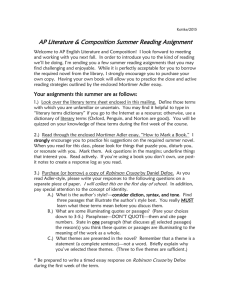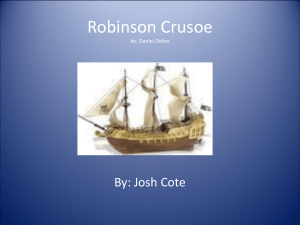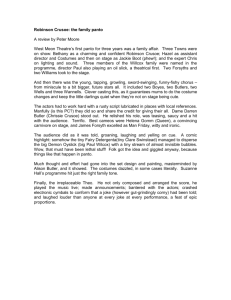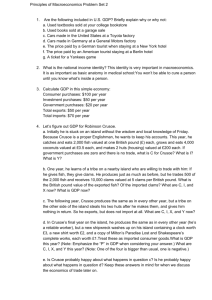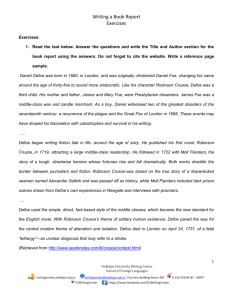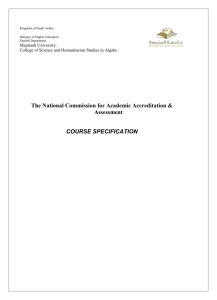Robinson Crusoe Summer Assignment
advertisement
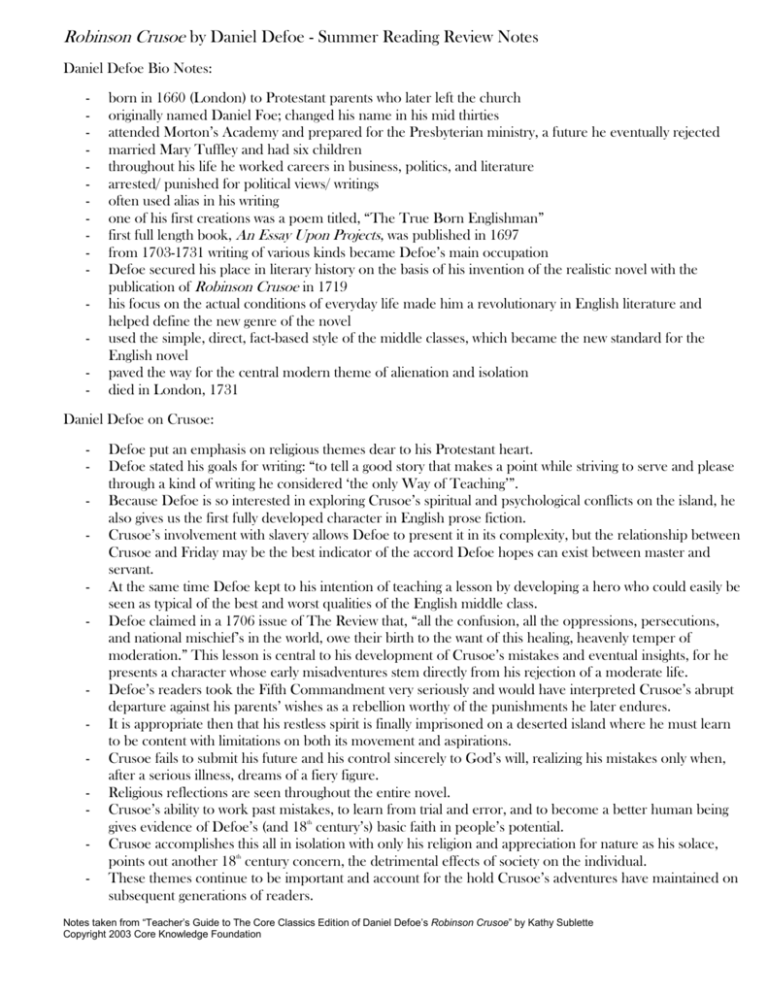
Robinson Crusoe by Daniel Defoe - Summer Reading Review Notes Daniel Defoe Bio Notes: - born in 1660 (London) to Protestant parents who later left the church originally named Daniel Foe; changed his name in his mid thirties attended Morton’s Academy and prepared for the Presbyterian ministry, a future he eventually rejected married Mary Tuffley and had six children throughout his life he worked careers in business, politics, and literature arrested/ punished for political views/ writings often used alias in his writing one of his first creations was a poem titled, “The True Born Englishman” first full length book, An Essay Upon Projects, was published in 1697 from 1703-1731 writing of various kinds became Defoe’s main occupation Defoe secured his place in literary history on the basis of his invention of the realistic novel with the publication of Robinson Crusoe in 1719 his focus on the actual conditions of everyday life made him a revolutionary in English literature and helped define the new genre of the novel used the simple, direct, fact-based style of the middle classes, which became the new standard for the English novel paved the way for the central modern theme of alienation and isolation died in London, 1731 Daniel Defoe on Crusoe: - - Defoe put an emphasis on religious themes dear to his Protestant heart. Defoe stated his goals for writing: “to tell a good story that makes a point while striving to serve and please through a kind of writing he considered ‘the only Way of Teaching’”. Because Defoe is so interested in exploring Crusoe’s spiritual and psychological conflicts on the island, he also gives us the first fully developed character in English prose fiction. Crusoe’s involvement with slavery allows Defoe to present it in its complexity, but the relationship between Crusoe and Friday may be the best indicator of the accord Defoe hopes can exist between master and servant. At the same time Defoe kept to his intention of teaching a lesson by developing a hero who could easily be seen as typical of the best and worst qualities of the English middle class. Defoe claimed in a 1706 issue of The Review that, “all the confusion, all the oppressions, persecutions, and national mischief’s in the world, owe their birth to the want of this healing, heavenly temper of moderation.” This lesson is central to his development of Crusoe’s mistakes and eventual insights, for he presents a character whose early misadventures stem directly from his rejection of a moderate life. Defoe’s readers took the Fifth Commandment very seriously and would have interpreted Crusoe’s abrupt departure against his parents’ wishes as a rebellion worthy of the punishments he later endures. It is appropriate then that his restless spirit is finally imprisoned on a deserted island where he must learn to be content with limitations on both its movement and aspirations. Crusoe fails to submit his future and his control sincerely to God’s will, realizing his mistakes only when, after a serious illness, dreams of a fiery figure. Religious reflections are seen throughout the entire novel. Crusoe’s ability to work past mistakes, to learn from trial and error, and to become a better human being gives evidence of Defoe’s (and 18th century’s) basic faith in people’s potential. Crusoe accomplishes this all in isolation with only his religion and appreciation for nature as his solace, points out another 18th century concern, the detrimental effects of society on the individual. These themes continue to be important and account for the hold Crusoe’s adventures have maintained on subsequent generations of readers. Notes taken from “Teacher’s Guide to The Core Classics Edition of Daniel Defoe’s Robinson Crusoe” by Kathy Sublette Copyright 2003 Core Knowledge Foundation Literary Notes: - Robinson Crusoe is considered the first English novel. - Time and Place Written – 1719; London, England - Setting – from 1659- 1694; York, London, Sallee, Brazil, the island off of Trinidad, England - Point of View – first person - Protagonist – Robinson Crusoe - Antagonist – the island, Crusoe himself - Exposition – Crusoe was born in 1632 in the city of York. He is the youngest of three brothers and is encouraged by his father to take up the law. However, Crusoe is inclined to go to sea instead of accept a life in the “middle”. - Rising Action – Crusoe disobeys his father and goes out to sea. He has a profitable first merchant voyage, has fantasies of success in Brazil, and prepares for a slave gathering expedition. - Complication – Crusoe becomes shipwrecked on an island near Trinidad, forcing him to fend for himself and his basic needs. - Climax –Crusoe becomes very ill and has a dream of a fiery figure and repents and turns to God (Personal). After years of solitude Crusoe discovers a footprint and learns his is not alone on the island. To his great horror, the inhabitants are cannibals. Crusoe rescues Friday from the cannibals (Story). - Falling Action – An English longboat full of sailors lands on the island. Crusoe learns that the men have mutinied against their captain. After Crusoe helps restore order to the ship, the men and captain pledge allegiance to Crusoe and agree to take him home. - Resolution – Crusoe returns to Europe with Friday, where he comes into a great deal of money from his sugar plantations. Crusoe gets married and eventually revisits the island in his later years. - Foreshadowing – Crusoe suffers a storm at sea near Yarmouth foreshadowing his shipwreck years later. He dreams of cannibals arriving and later they come to kill Friday. Crusoe invents the idea of a governor of the island to intimidate the mutineers foreshadowing the actual governor’s later arrival. - Conflicts – Shipwrecked alone, Crusoe struggles against hardship (man vs. nature), loneliness/ selfreflection (man vs. self), and cannibals (man vs. man) in his attempt to survive on the island. - Themes - determination and hard work, friendship and loyalty, relationship w/ nature, faith in God (necessity of repentance), the importance of self-awareness, mastery over one’s environment/ situation - Symbols – footprint - conflicted feelings about human companionship the cross - time keeping device/ relating himself to the outside world the bower - Crusoe’s desire for enjoyment/ improvement in his attitude about his situation Robinson Crusoe Summer Reading Assessment British Literature Short Answer Questions 1. What kind of life would Crusoe have had if he has obeyed his father and remained at home? What signs does Defoe give us that Crusoe was not suited for the life his father wanted for him? 2. Do you think Crusoe is generous and fair in his treatment of Xury? Explain. 3. What is Crusoe’s attitude when he finds the money on the ship? What does he learn about wealth and money? 4. How has Crusoe’s attitude changed after two years on the island, especially concerning what makes him happy? 5. What does Crusoe consider surprising or ironic about his reaction to evidence that someone else has been on the island? 6. What does Crusoe think about constantly for the fifteen months after he sees the savages on the beach? 7. What is the meaning of the runaway’s gestures and movements as he approaches Crusoe? 8. How does Friday’s presence change Crusoe’s attitude about the island? 9. Describe Friday’s role in the ambush of the cannibals. What does his behavior reveal about his personality? 10. How do you think Crusoe felt when he revisited the island? Paragraph Response 1. What do you think were Crusoe’s most remarkable achievements? By discussing at least three of them in detail, show what you think Defoe is saying about what is important in a person’s life. 2. Daniel Defoe was a religious man. Discuss how this can be seen in his novel by analyzing Crusoe’s changing religious beliefs and attitudes towards God. Include an explanation of what you think is the most important scene that develops this theme. 3. What statement do you think Defoe is making about materialism (the desire to acquire money and possessions)? Show how Crusoe’s attitude toward wealth changes, but also include a discussion of why you think Defoe had him end the novel a wealthy man. 4. By comparing and contrasting Crusoe’s treatment of Xury and Friday, discuss whether Crusoe has changed by the end of the novel. Think about the promises he makes to both men, how he affects their futures, and the amount of respect he gives each one.
